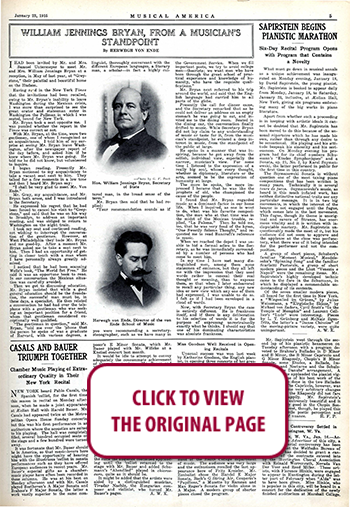 100 YEARS AGO...IN MUSICAL AMERICA (77)
100 YEARS AGO...IN MUSICAL AMERICA (77)
January 23, 1915
Page 5
WILLIAM JENNINGS BRYAN FROM A MUSICIAN’S STANDPOINT
By Herbert von Ende
I HAD been invited by Mr. and Mrs. Samuel Untermeyer to meet Mr. and Mrs. William Jennings Bryan at a reception, in May of last year, at “Greystone,” their palatial and beautiful home on the Hudson.
Having read in the New York Times that the invitations had been recalled, owing to Mr. Bryan’s inability to leave Washington during the Mexican crisis, I was more than surprised to see the great orator and statesman enter in Washington the Pullman in which I was seated, bound for New York.
Mr. Bryan took a seat opposite me. I was puzzled whether the report in the Times was correct or not.
With Mr. Bryan, at the time, were two gentlemen, one of whom I recognized as an acquaintance. I told him of my surprise at seeing Mr. Bryan leave Washington, after the newspaper report of the day before, and asked him if he knew where Mr. Bryan was going. He told me he did not know, but volunteered to inquire.
I began reading. Presently Mr. Bryan motioned to my acquaintance to take a vacant seat next to him. They talked for a few moments in a low tone and then I heard Mr. Bryan say:
“I shall be very glad to meet Mr. Von Ende.”
Mr. Gray, my acquaintance, and Mr. Bryan both arose, and I was introduced to the Secretary.
He expressed his regret that he had been forced to cancel his visit to “Greystone,” and said that he was on his way to Brooklyn, to address an important meeting, and was obliged to return to Washington on the night train.
I took my seat and continued reading, not wishing to interrupt the conversation of the gentlemen. However, at West Philadelphia they bade Mr. Bryan and me good-by. After a moment Mr. Bryan asked me to take a seat next to him. Then I had an opportunity of getting in closer touch with a man whom I have personally always greatly admired.
I noticed that he had been scanning Wells’s book, “The World Set Free.” He said it was an opportune book to read. In our conversation the Mexican situation was carefully avoided.
Then we got to discussing education. Mr. Bryan insisted that while a good general education should be the foundation the successful man must be, in these days, a specialist. He then related a conversation he had had over the telephone with a gentleman who was seeking an important position for a friend, whom that gentleman considered exceptionally well qualified.
“The gentleman in question,” said Mr. Bryan, “told me over the ‘phone that the person he spoke of was a graduate of Harvard, with various degrees, a linguist, thoroughly conversant with the different European languages, a literary man, a scholar—in fact a highly cultured man, in the broad sense of the term.”
Mr. Bryan then said that he had replied:
“Your recommendation sounds as if you were recommending a secretary-stenographer, such as we have many in the Government Service. When we fill important posts, we try to avoid college men—theorists; we want men who have been through the great school of practical experience and knowledge of humanity, who have the requisite qualifications.”
Mr. Bryan next referred to his trip around the world, and said that the English language had carried him to all parts of the globe.
Presently the call for dinner came, and the Secretary remarked that as he could not deliver an address on an empty stomach he was going to eat, and invited me to the dining room. Seated in the dining car, the conversation finally drifted to music. While Secretary Bryan did not lay claim to any understanding of music or taste for it, from the musician’s standpoint, he evinced a deep interest in music, from the standpoint of the public at large.
He spoke in a manner that was inspiring, because he got away from the selfish, individual view, especially the narrow, musician’s view. For some time I listened to the expression of a really big soul, whose every thought, whether in diplomacy, literature or the arts, seemed to be the expression of humanity at large.
The more he spoke, the more impressed I became that he was like the prophets of old, who championed the cause of the people.
I found that Mr. Bryan regarded music as a dominant factor in our home life. When I inquired, as one is wont to do, what was his favorite composition, the man who at that time was in the midst of the Mexican trouble, replied, “La Paloma.” Then he told me, too, that he was very fond of the hymn, “One Sweetly Solemn Thought,” and requested me to read Bancroft’s reference to music.
When we reached the depot I was unable to bid a formal adieu to the Secretary, as he was immediately surrounded by a number of persons who had come to meet him. In my time I have met many distinguished men, among them some statesmen of eminence, but they all left me with the impression that they used words rather to conceal their real thought or meaning, than to express them, so that when I later endeavored to recall any particular thing, any new idea or new view which any one of them had expressed, I was unable to do so. I felt as if I had been enveloped in a cloud of words.
Now, with Secretary Bryan the case is entirely different. He is frankness itself, and if there is any deliberation to his selection of words it is for the purpose of expressing unrestrainedly exactly what he thinks. I should say that one of his dominating characteristics was absolute frankness.




 RENT A PHOTO
RENT A PHOTO





